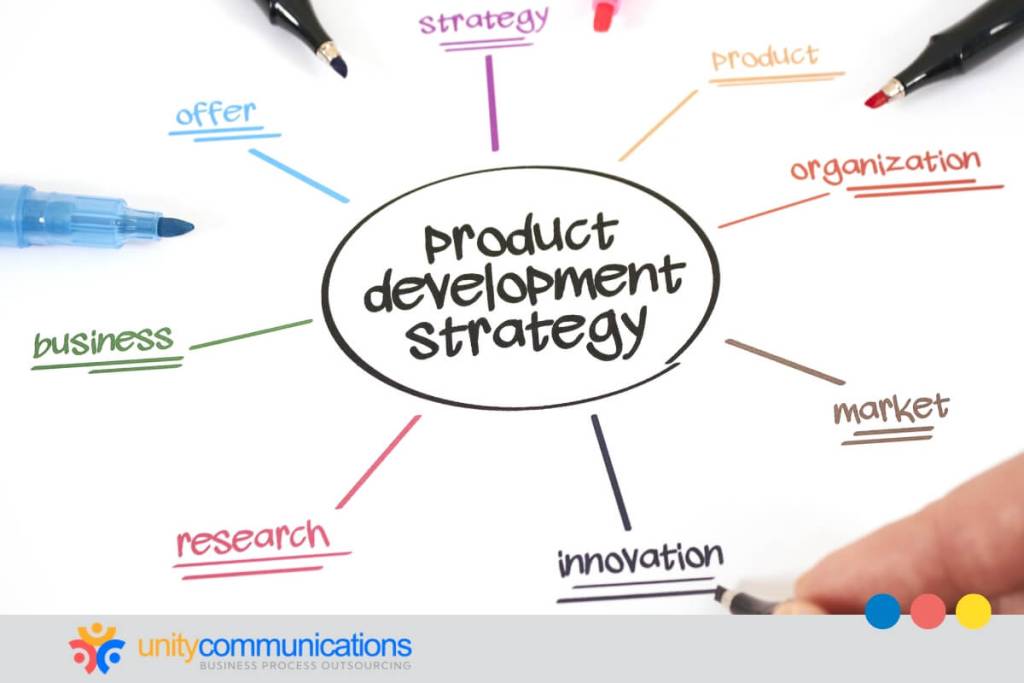IN THIS ARTICLE
Table of Contents
The race to innovate and deliver products is relentless in today’s competitive market. The challenge lies in balancing the need for agility with the complexities of product development. This is where business process outsourcing (BPO) can be a game changer.
By strategically incorporating BPO into the product development lifecycle, you can streamline processes, reduce costs, and accelerate time to market. Read on to explore how BPO can help your business navigate this demanding landscape.
Utilizing BPO for efficient market research

Market and consumer research lay the foundation for product success. They offer valuable insights on regional and worldwide trends, supporting data-driven decision-making in product development.
Market research examines product and service demands, client demographics, and previous and current circumstances. Meanwhile, customer research helps develop comprehensive target client profiles to inform the development approach.
Both processes are time-consuming, resource-intensive, and expertise-driven. Leveraging BPO services ensures efficiency and benefits the product development lifecycle. But what is BPO’s role in market research?
Outsourcing allows access to specialized expertise and resources. Third-party specialists utilize advanced tools and processes to gather and analyze data on consumer behavior, competitor products, and emerging trends.
Outsourcing accelerates timelines and improves accuracy in market research, allowing you to proceed with product development using reliable data. It also reduces the risk of costly missteps later in the lifecycle.
Accelerating product design and prototyping with BPO
Product design involves creating a tangible representation of a product concept, focusing on aesthetics, functionality, and user experience (UX). Meanwhile, prototyping is building a product model for testing and feedback before final production.
These processes are complex, which is why companies often turn to outsourcing. BPO partners provide expertise in UX, industrial design, and 3D modeling. They also offer established processes and agile workflows to speed up work, meet tight deadlines, and adapt to project changes.
Design and prototyping often involve costly materials and tools as well as multiple iterations, which can strain budgets. BPO firms offer lower costs than internal operations, allowing you to reallocate savings to critical assets. In short, a BPO partnership can lead to cost-effective product development.
Delivering what users expect while keeping costs in check is a delicate balancing act. Whether you want to streamline operations or free up resources, partnering with a reliable provider of software product development services or physical prototyping can make all the difference.
Strategic outsourcing also shrinks the gap between design iterations so teams can build on each refinement and precisely shape products. BPO partners help you make a working model to improve upon to capture the market’s pulse with precision.
Enhancing innovation through collaborative BPO partnerships
Innovation is a critical differentiator in today’s competitive landscape. Companies that consistently introduce new and improved products or services are more likely to succeed and thrive. For developers, innovation is not just a goal but a necessity.
BPO providers are vital in fostering innovation within companies. Their experience across various industries and clients can provide fresh perspectives and insights that internal teams might overlook. Additionally, BPO firms often have access to cutting-edge technologies and tools to help companies push the boundaries of what is possible.
With BPO for the product development lifecycle, you can leverage external expertise to drive innovation at every stage. You can freely experiment with fresh technologies without the intimidating upfront investment of time and resources.
Leveraging BPO for cost-effective development and testing
The costs of the development and testing phases can often skyrocket. Whether working on a new software update or a revolutionary gadget, many companies’ most significant obstacle is balancing high standards with lean spending.
Software development costs can range between $50,000 and $1 million for medium to large applications. However, several factors determine the exact expenses, such as:
- Software complexity. The cost increases with the number of features and sophisticated design patterns.
- Development type. Custom development is typically more expensive than low-code or platform-based alternatives.
- Development team. Expenses depend on the team’s size, skill level, and location.
The average cost of software testing ranges between 15% and 25% of the project’s total price. Include the following when estimating the testing expenses:
- Personnel costs include the testing team’s pay, benefits, and training. The yearly cost of a mid-sized squad could range from $225,000 to $560,000.
- Infrastructure costs involve cloud services, hardware, and software, ranging from $10,000 to $112,000 annually.
- The costs of tools depend on the platforms used. While premium suites might cost as much as $56,000, open-source applications might only cost about $3,400 annually.
BPO for the product development lifecycle can be more budget-friendly. Access to skilled developers and engineers might be a fraction of the cost of maintaining an in-house team.
By eliminating onboarding, training, equipment, and office space expenses, you can save up to 70% on labor costs when outsourcing in a low-cost market such as the Philippines. For example, the average salary for a software developer in the U.S. is around $79,000 per year. However, developers in the Philippines earn about $11,000 annually.
Partnering with a BPO provider also means you will likely benefit from proven methodologies and tools in project management, development, and testing, driving down the cost further.
Enhancing quality assurance processes through BPO

A high-quality assurance (QA) process is essential for delivering a product efficiently. However, building an in-house QA team requires significant time and resources.
By outsourcing QA to specialized BPO providers, businesses can benefit from experienced teams. BPO firms also use advanced tools and methodologies to thoroughly test products before they hit the market, guaranteeing quality, functionality, and user satisfaction.
BPO providers offer rigor and expertise that can be difficult to match internally. Backed by extensive experience in QA, they can find issues you might have missed.
Streamlining supply chain management with BPO solutions
For companies that build, assemble, or manufacture products, the success of their supply chain is make or break. It’s a delicate balance of resources, timelines, and quality control. Every aspect of the supply chain affects the product development process, from sourcing materials to coordinating with manufacturers and logistics partners.
Operational efficiency improves when external experts handle support functions so in-house teams can tackle strategic initiatives. As BPO teams manage supply chain logistics, companies can seamlessly fine-tune their operations and eliminate logjams.
Securing a BPO partner specializing in supply chain analytics and management guarantees effective material sourcing, prompt production, and on-time delivery. Businesses might focus on their primary skills without worrying about delays.
Improving time to market with BPO support
In today’s fast-paced business environment, speed is crucial. The faster a company can move through the product development lifecycle, the greater its competitive advantage. BPO for product development lifecycle can significantly reduce time to market (TTM) by streamlining various processes, from design and development to testing and launch.
BPO providers bring the human resources that enable businesses to accelerate every step of the product lifecycle. As a result, faster TTM happens without compromising quality or performance. For startups and smaller outfits, this means expansion while staying on budget.
TTM is typically measured in days or weeks, but it can be months or even years, depending on the industry and product complexity. While preserving quality is crucial, a faster TTM offers these significant advantages:
- Increased revenue. With less competition, launching your product earlier enables you to make money more quickly.
- Reduced costs. Cutting the development phase’s length lowers production costs and boosts profitability.
- Greater market share. Your market share could grow if you enter the industry early because of less competition.
- Better brand recognition. Being the first to market improves brand reputation. For instance, despite the launch of Instagram Reels, Facebook Stories, and YouTube Shorts, TikTok remains the most popular short-form vertical video platform.
Optimizing product launch strategies via BPO
Launching a product successfully requires more than just a minimum viable product. Pulling off a plan requires the right balance.
Any successful firm, regardless of size or industry, starts with a carefully designed marketing strategy. Logistics, customer connections, and branding are critical components that boost success when correctly balanced and executed.
The BPO vendor helps identify areas where you can remove waste, streamline operations, and add momentum to your growth. From strategy to execution, BPO companies cover it all, generating buzz before launch and providing ongoing support afterward.
BPO for effective post-launch support and maintenance

One-off victories aren’t enough to win the long game. Companies must consistently refine their creations.
Ignoring post-launch support might have negative consequences. Large firms could lose up to $9,000 per minute from downtime or over $5 million per hour in high-risk sectors such as healthcare and finance. This still does not cover any possible fines or penalties.
BPO providers can assist with post-launch support. By outsourcing this responsibility to specialists, businesses can leverage constant performance, timely upgrades, and round-the-clock customer service.
Businesses often look to BPO providers for a flexible staffing solution that adapts to changing demands. They can expect a two-fold advantage: they reap the benefits of refined UX while internal teams focus on upcoming projects.
Integrating customer feedback into product development with BPO
Using customer data from BPO partners enables you to spot problem areas immediately and seize opportunities. BPO companies collect feedback across all online and offline channels, providing real-time data that helps you understand customers’ demands and make timely modifications.
Companies can stay aligned with user expectations by fine-tuning offerings as they develop instead of waiting for a final product to assess its success. They can tap into BPO providers’ customer relationship management expertise to supercharge their product development process with real-time feedback, enhancing products and strengthening customer bonds.
Through outsourcing, businesses can access new concepts and demographic data they would not otherwise have. With this flexibility, companies can improve their offerings to perfectly align with market demands, boosting their chances of success.
Scalability and flexibility in product development through BPO
One of the most significant benefits of BPO is the ability to scale operations quickly. When companies expand, their requirements for product development shift. BPO for product development lifecycle allows businesses to adjust their resource levels in response to growing demands without overcommitting internal staff.
Whether expanding the product development team to handle a new project or scaling back after a product launch, BPO offers agility that can be difficult to achieve with an in-house team alone. Imagine instantly scaling up or down to match changing requirements—that’s the power businesses unlock with flexible operations.
The bottom line
The power of outsourcing lies in transforming each stage of the product development lifecycle into a seamless, efficient operation. Integrating BPO, from market research to post-launch support, empowers companies to focus on their core functions while external experts manage the back end. This leads to better products, faster time to market, and long-term cost savings.
Companies can create a more robust product by working with a reliable BPO partner. Whether you’re an established business trying to streamline your operations or a startup trying to penetrate the market, BPO provides the adaptability and experience you need to beat the competition.
Ready to start on a new path toward success? Let’s connect and discuss your product development needs!





